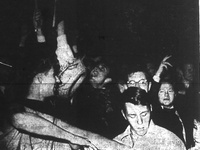
Students rioting outside of Widner library in protest of the administration's decision to change the language of the diploma's from Latin to English.
Despite being a Harvard College alumnus, Charles D. Ravenel ’61 does not have his undergraduate diploma hanging on his office wall. Instead, his eight-and-a-half by eleven sheet of paper, declaring the completion of his studies at Harvard, lies tucked away out of view.
Like many of his peers, Ravenel was upset by the College’s decision to change diplomas from the traditional Latin to English—a switch that set off a flurry of lighthearted but sincere protest in the spring of 1961.
“It was so unseemly for the dignity and history of Harvard,” Ravenel says. “It certainly wasn’t something graceful, something stately, or something worth putting on the wall.”
A RESOUNDING ‘NO’
The news that the Class of 1961 would be the first class to be given English diplomas was not well received. On Wednesday, April 26, 1961, the change incited more than 2,000 students to crowd the steps of Widener Library. The next night, The Crimson reported that nearly 4,000 boisterous students showed up—though participants remember far fewer.
Multimedia
After hearing the news that the diplomas would be changed, as the first class marshal, Ravenel was approached by numerous students disconcerted by the change in tradition. Ravenel attended a meeting with University President Nathan M. Pusey ’28 on behalf of students to voice their concerns.
Ravenel recalls the meeting as wholly unproductive. After proposing a number of ideas to Pusey, including having seniors opt to pay for traditional diplomas—which, in addition to being written in Latin, were larger and more elaborately printed—Ravenel left with a resounding “no” ringing in his ears.
“He wanted complete control,” Ravenel says. “He wouldn’t budge an inch, and no one could stop him.”
The Crimson reported at the time that Pusey believed issuing diplomas in Latin would be hypocritical given that Latin neither remained a requirement for Harvard undergraduates, nor was it any longer the universal language of academia. But a number of students also say that they suspect the cost of diplomas played a large role.
LATIN SI, PUSEY NO
Few undergraduates found Pusey’s answers satisfactory, and rumblings of discontent continued to grow in the days after the announcement was made. A group of students hung a sign from their Leverett House window declaring: “We Want Latin,” and petitions gathered several hundred signatures in support of the tradition.
“It wasn’t just an English diploma, but a really silly looking English diploma that was not in keeping with what a Harvard graduate should look like,” Michael Abbell ’61 says.
The dissatisfied students soon became restless.
“We decided we wanted someone to put some pressure on President Pusey,” Ravenel says.
Student annoyance culminated in a protest that lasted three days before finally losing momentum.
Read more in News
Timothy E. WirthRecommended Articles
-
Making Diplomas ModernI’m more than happy to type Harvard under the education section of my resume. But when it comes to specifying
-
Russian Criminal Group Forges College DiplomasRussian police have arrested a criminal group responsible for the trafficking of counterfeit college diplomas, including those from Harvard, according to a statement released by the state-run news outlet Russian Information Agency Novosti.
-
Down With Latin HonorsRemoving the system of Latin honors would increase the overall academic quality at Harvard by encouraging students to take courses based on genuine interest rather than a superficial concern for GPA.
-
On the HLS DiplomaHarvard need not give up its rich Latin tradition in order to improve the communicative impact of its diplomas.
-
NDEA Grants Ignite Debate Over Cold War LoyaltyIn November 1959, Harvard withdrew from the NDEA student loan program, joining universities from across the country in protest against the affidavit and the limitations on free speech that it entailed.
-
The Shame of Behavioral HealthThis university has great resources to help us manage the many stressors associated with professional life. We should never be ashamed to take advantage of them!














